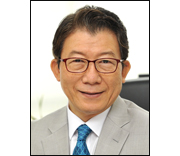-
[October 4. 2016 Korea times] Chaebol, foreign firms for dream team
- Date : 2016.10.06
- Views : 684
Chaebol, foreign firms for dream team

By Jeffrey I. Kim
Foreign investors ask me various questions and express concerns at formal meetings. Among them is the incompatibility of chaebol and foreign firms. Chaebol refers to a business conglomerate. It is also called a large corporate group in Korea. There are 30 large corporate groups.
For now, a total of 17,000 foreign firms are doing business in Korea. They are small and medium in size although a large proportion of their mother companies may be sufficiently large. Many CEOs of these foreign firms fear that their business interests are potentially at odds with those of Chaebol.
Chaebol holds a multiple number of affiliated companies under one management. They have plunged into risky and heavy industries such as the petro-chemical industries with help from the government. They were able to mobilize industrial capital at low cost. Since the early 1970s, they have greatly extended the scope of their business activities by engaging in manufacturing, marketing, services, finances, R&D, etc. Samsung, Hyundai, LG, SK, and others are global players with high banners.
Due to differences in the language, culture, law, and local custom, foreign investors in Korea unexpectedly encounter numerous problems. Consequently they often bring their business difficulties and grievances to us at the Office of Foreign Investment Ombudsman for resolution. Some are concerned that the chaebol would eventually engulf all the foreign firms that challenge them by their humongous business power.
They tend to believe that Korea’s large conglomerates exercise business monopoly power over small-scale suppliers and sub-contractors and they harshly cut the prices of intermediate goods or OEM products. What was worse, they used to delay their payment for no good reasons. The foreign-invested companies also believe that the chaebol capture the lion’s share even in the MRO (maintenance, repair, and operation) markets. Because most of the foreign firms are small and medium size, they fear that they would soon be driven out of the industry. They may consider that chaebol is like a Cookie Monster to which they had been exposed when they were young children.
Cookie Monster is a muppet on the long-running children’s TV show Seasame Street. This show started in the late 1960s. He has googly eyes and his manner is gruff. Most of all, he is best known for his voracious appetite. He eats just about anything. He even gobbles up inedible objects although his favorite food is chocolate chip cookies. Those who spent their youth during the 1970s remember this show well.
However, much of what is described above is no longer true. They have become the anecdotes of the past. Things have changed a lot. The relationship between the large corporate groups and SMEs has also changed a lot since the start of the new millennium.
Korea’s six biggest chaebol make up more than 70 percent of Korean exports. But SMEs provide more than 80 percent of Korea’s jobs. So the chaebol recognize the importance of the SMEs as key suppliers. Former presidents all have supported the SMEs. Consequently the relationship between chaebol and SMEs has also much improved.
Moreover, the Korean government has taken various measures to make things easier for SMEs under the slogan of ‘shared growth.’ While restricting the reckless expansion of the chaebol’s business, the government provides the SMEs with a good variety of measures to promote their innovative work, R&D, and recruiting smart young people. Of course foreign firms in Korea are entitled to receiving equal treatment by the national treatment principle.
At present, Korea needs to create a large number of new jobs. The foreign firms can meet our needs by using their innovative work and high technology. In the meantime, chaebol have many things they can do. Chaebol need to sustain competitiveness in the global markets. To fight against the increasing risk and uncertainty in the global markets as well as in the domestic market, they need to form strategic partnerships with foreign firms.
Under these circumstances, small-sized foreign firms should not fear the chaebol. In fact, chaebols are willing to have partnerships with the foreign firms with new high technology. In this way the large corporate group and foreign firms can make a dream team.
http://www.koreatimes.co.kr/www/news/opinon/2016/10/197_215240.html










